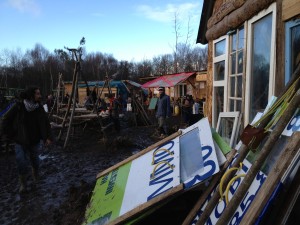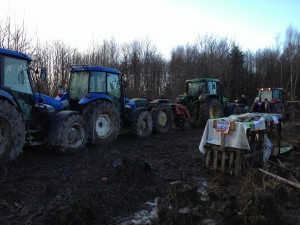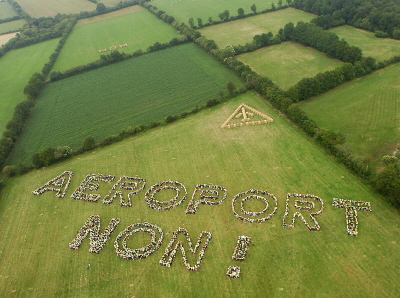ZAD Movement in France Reflecting a Strong Anti-Capitalism
by Julie Gorecki, Basics Community News Service
 PARIS – In the forests of the small French village of Notre-Dame-des-Landes (NDDL), you’ll find farmers ignoring eviction notices, activists strapped to tree tops, and police barricades surrounding the area. When entering NDDL you see the word “ZAD” sprayed all across city walls and road signs. It means “Zone a Défendre”, or “Zone to Defend” in English. Stop signs are plastered with stickers that read “No Airport!”
PARIS – In the forests of the small French village of Notre-Dame-des-Landes (NDDL), you’ll find farmers ignoring eviction notices, activists strapped to tree tops, and police barricades surrounding the area. When entering NDDL you see the word “ZAD” sprayed all across city walls and road signs. It means “Zone a Défendre”, or “Zone to Defend” in English. Stop signs are plastered with stickers that read “No Airport!”
The mobilization against the construction of a second airport outside of the French city of Nantes came out of a 2009 French Climate Camp. The aim, was the same as all other climate camps that had gained serious force in Europe at the time; self sustain, educate, debate and mobilize towards “system change not climate change.” Direct actions were planned in week one and executed in week two. It was here that climate justice activists started planning to block the development of the airport. The first step was occupying the land where the airport would be built. In the following months a small group indefinitely moved into the forests of NDDL and started constructing cabins. They sent out a call out across Europe mobilizing activists to join them in an anti-capitalist movement saying “NON!” to the new airport.
Three years later a wide range of leftist groups from France and abroad inhabits the area. It has become what some call a self-sustaining community of “eco-anti-capitalist resistance”, while others have labeled it “Europe’s largest post capitalist protest camp.” Whichever way you look at it, it has become a prime example of direct action for system change in Europe.
Today, groups present at ZAD range from the association of farmers, to trade unionists, radical environmentalists and anarchists. There is also a heavy dose of those who wear no political label but are deeply engaged, while artist activists are also out in good numbers. In the midst of this diversity of radical political stripes and sectors, there is a powerful solidarity between the inhabitants, who are now known as “Zadists.” They are united by one common end – challenge the exploitation of our current economic system by stopping the construction of an airport, do so by physically occupying the land where they plan to build it, and autonomously construct the alternative.
The result has been an array of self-made shelters ranging from mud huts, impressive wood cabins, to tree houses nestled high in trees. For those who live at ZAD permanently, construction has extended to things needed to make life good within the zone. Self-managed bars, communal vegan kitchens, art spaces, and a recently built nursery to make engagement with parents easier, are all examples of how developed this place really is.

La Chataigne welcoming camp at ZAD
ZAD’s level of organization is nothing less than outstanding, demonstrating the power people have when they come together. Camps, buildings, and intersections have all been named and put onto an easy to read map. Weeks are packed with endless seminars, workshops, and days of construction. Activities include countless topics such as anti-repression, dealing with state violence, to forms of art resistance and vegan cooking workshops. “Life here is mostly good. It takes some time to adjust to a few things, but the good things about it beat the rest. Like the calm, the community… knowing that I’m completely independent from the system while fighting it at the same time. It’s good. I’m happy here,” says Pierre, (a cover name, to protect his identity from police) who has been living at ZAD for about 8 months.
ZAD keeps this massive community connected with its very own pirated radio station called “radio klaxon.” Klaxon reports on where the police are located, updates on daily actions and reminds its listeners of the diverse message of ZAD by broadcasting shows on various issues concerning Zadists. That being said, the level of critical discussions about political views, ideologies, and how to live well together at ZAD do not go ignored. ZAD is based on fighting interconnected systems of oppression that not only exploit the environment but also minorities, marginalized people and women. Several collectives have formed on site to keep this significant systematic critique alive.
One of them is the women’s only “Women, Trans, Dyke” group who empowers women and lesbians in the zone. They have also held mixed anti-sexism and anti-homophobic meetings as a reminder of the several forms of capitalist domination many Zadists are fighting.
It is difficult to judge how many people live on the site, but it is said to fluctuate between 200-500 permanent residents, and with visitors and special events there can be up to 1000 people moving through the zone. Days of national mobilizing and action have seen up to 20,000 supporters.
However, in October of 2012, the government announced that before November they would evacuate ZAD for good. It wasn’t a good ecological start for newly-elected “Socialist” President Francois Hollande – acting like just another capitalist – who promised to put climate change high on his political agenda. More importantly Hollande elected Jean Marc Ayrault, the mayor of Nantes between 1989-2012, as France’s prime minister. Ayrault also happens to be the main man behind the airport project and has been pushing its development for decades. Protestors have developed the popular catch slogan “NON Ayrault’port”, as a creative alternative to “NO Airport.” However, with his new political powers Ayrault has only intensified his efforts in continuing the airport project.
Last October police forces numbering 1200 moved into ZAD under the code name “Operation Cesar.” Tear gas, pepper spray, and rubber bullets were their weapons of choice, leaving many injured. Bulldozers also rolled in crushing a high number of significant standing structures. Police elevated in cranes wrestled people out of tree houses. In many cases they used tear gas or pushed on pressure points on activists bodies to speed up the process. These expulsions went on for most of October and have continued sporadically since then. It was then that French mainstream media started paying attention to images of farmers and Zadists getting roughed up. Images of tear gas turning pristine forests into smoky battlefields were aired across the nation. Yet, the inhabitants stuck by their word and with great effort defended the zone. They built immense road blockades, locked themselves into structures, hung from difficult to reach trees, and stood strong in the face of police lines. On November 17th a call out was put out for a weekend of protests and action to rebuild all that has been destroyed at ZAD.
The response was tremendous. An estimated 30 000 showed up in the streets of Nantes, and then moved to ZAD in order to start reconstructing. Several structures were re-built and 40 tractors, chained tightly together, now form a protective ring around the welcoming camp “la Chataigne.” Thousands gathered in Nantes and across France the following weeks to make their voices against the construction of the airport heard.
“The citizens of Nantes don’t want this second airport. We are strongly opposed. Look at the protests! Look at the resistance! With today’s climate change we must develop industries that don’t contribute to the problem,” says Elisabeth, a life long resident of Nantes and supporter of ZAD.
The fierce resistance has ended the expulsions for now and today ZAD is as active as ever. They have been successful in holding down camp, and rebuilding what has been lost. The difference is that now they do so enclosed within police lines and at constant threat of another destructive eviction.
Tensions between the government and those resisting the airport are much older than the ZAD settlement itself. In the 60’s there were already quarrels between farmers and the state on changing traditional methods of farming within the region. Moreover, the same airport project the Zadists are fighting today was first proposed in 1972.

5 tractors out of 40 that are chained together around La Chataigne
Resistance led by local farmers and residents has gone on since then, making the struggle more than 40 years old. Unlike the massive factory farms of North America that shell in extraordinary yearly profits, the farming industry in France still largely functions on a small-scale level. Farmers usually inherit their land from ancestors and the profession still has the reputation of hardly making a profit. Their average annual earnings range around 24 000 euros a year depending on what they’re farming. Most of the farms at ZAD are dairy farms, which are known to earn even less. The high rate of suicides among French farmers is a sad symptom of their struggle. Farmer’s unions form a significant part of the labour movement in France. In relation to ZAD, the ACIPA, a collective of 45 local anti-airport associations including far left political groups, and trade unionists, is the organization that has mobilized farmers and locals against the construction of the airport.
There are of course significant ideological differences between farmers and the tree squatting activists of ZAD. At certain times they have caused serious tension. Nevertheless, the movement has seen a remarkable level of unity and friendships evolve between all groups there. Farmers have been seen standing between lines of police and balaclava-wearing activists and in some cases have even opened up their farms to aid Zadists.
The attacks on the ZAD settlement itself have significantly increased awareness and support for the movement. Now it is being compared to the famous 1970’s struggle of Larzac, a movement of farmers who mobilized against the construction of a military base on their land. After 10 years of strong resistance, they won. Their victory was confirmed when the first-ever socialist president Francois Mitterrand came into office and obliterated the plan for the military base in Larzac. Today, Hollande has proven to ignore the footsteps of his predecessor, and instead stands against the many people he promised a much ‘lefter’ France. However, Zadists and supporters alike are looking to the victory of Larzac as inspiration and are not planning to back down any time soon.
Comments
